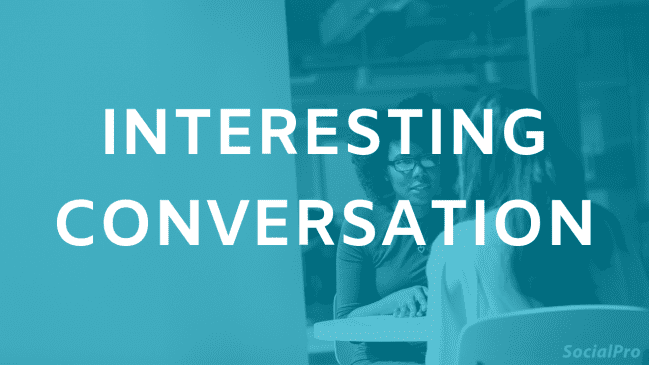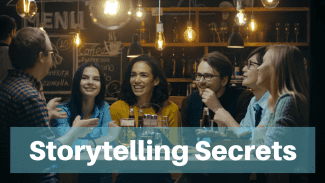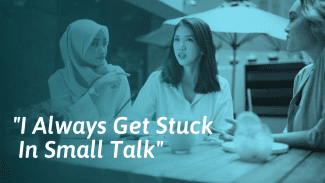How do you become more interesting to talk to? How do you make sure that people think it’s interesting to talk to you?
I’m sure you’ve been in the situation where you’ve run into your neighbor and they kept dragging on about their new favorite health food craze and why kale is the new quinoa. All the while, you were thinking about the pizza rolls in your freezer and how you were going to eat them promptly after the conversation, in spite of everything they just said.
It’s natural to not want to be invested in every single conversation you have with every single person you come in contact with every single day- that would be incredibly exhausting. The question is, how can you see if someone wants to continue talking or if they want to end the conversation?
If you’ve ever asked yourself something along the lines of…
“How would I know whether the person in front or on my device is really interested in talking to me? Is it just for the sake of being a good person they talk or do they really mean it?”
– Kapil B
… or …
“…how can I read the other person better? I am terrible at reading in between the lines”
– Raj P
there are some really helpful cues we can pay attention to. Learning how to see if someone wants to continue talking or if they want to end the conversation may not be as daunting as it may seem.
In fact, there are only general 4 cues you need to look out for:
1. Have you found common interests?
During the first few minutes of any new conversation, people are often tense and nervous. Even if they come off as distant, that doesn’t have to mean they don’t want to talk – they might just not know what to say.
After a few minutes, when you’ve “warmed up”, you’ll notice if the person makes an effort to keep the conversation going or remains passive.
As the conversation goes on and you continue to ask questions, you’ll hopefully find some common interests between you two because birds of a feather do flock together, according to research conducted at University of Cambridge. Based on the results of this study, they found that people in relationships with each other were more likely to have similar character traits to one another. If you’re similar to a person, you’re more likely to be friends with them, or in our case, have a more meaningful conversation.
The way this works is through the reference group effect, which means that when we judge others, we do so from our own personal point of view rather than an objective view.
For example, let’s say you’re a Star Wars fan, and you happen to come across someone who can’t tell Mace Windu from Finn. From your point of view, that’s common knowledge. Instead of having to explain the difference between the characters, you may be more likely to talk to someone in the future that already knows Jakku from Tatooine.
Because of this, we’ll tend to like people more that have the same interests or have the same kind of background as us.
When you find common interests, you’ll have much more to talk about. The other person may start to feel more at ease, the conversation will flow better, and the connection will be one that’s much more genuine.
Here’s an example of how I found a similar interest with someone that I didn’t think I had anything in common with:
One girl I once met told me that she works as an assistant on film sets. I know close to nothing about big movie film sets, but thanks to making an assumption, I turned this interaction into an interesting conversation. I (correctly) assumed that she’s also interested in filmmaking in general. Because I record a lot of videos for SocialSelf, I obviously think making films is interesting too.
Based on my hunch, I asked her if she films anything herself. Not too surprisingly, it turned out she did. We had a really great conversation about camera gear because I assumed she would have been into that sort of thing.
Finding commonalities may be a bit tricky at first. To do this you’ll want to:
- Ask personal questions to find out if you have things in common (common experiences, interests, passions, worldviews). Asking follow up questions is a great way to dive a bit deeper into the conversation and to cover a lot of ground fast.
- When you’ve found commonalities, that’s what you’ll want to base the conversation on. Continue asking follow-up questions to encourage the other person to share their experiences. When you talk about what you both think is interesting, you’re both likely to enjoy the conversation- It’s a win-win situation.
2. Who’s “world” have you spent the most time in?
Has the conversation mainly been around your own areas of interest and things concerning your world? Or has it been mainly around your friend’s areas of interest and your friend’s world? A conversation is half listening, half talking, so it’s a good idea to make sure that you’re both contributing.
Research shows that people love talking about themselves. I’m sure you knew that already, but researchers at Harvard discovered that when you talk about yourself, it’s like a reward for your brain. The “pleasure center” of your brain shows increased activity during a brain scan when you find something especially rewarding, like sex or food. The psychologists discovered that talking about yourself lights up that same exact pleasure center.
According to the study, if you want the other person to enjoy the conversation more, make sure that they’re talking about themselves, too.
A quick way to check if the conversation is equal is to ask yourself how many times you say the word “I” compared to the word “You”. If you say “I” several times more, you can balance the conversation by asking things like:
“So that’s how I spent my weekend. What did you do?”
“I love this song, too! Didn’t you go see them in concert a few years ago?”
“That’s what I thought of this awesome SocialSelf article about conversation. What did you think when you read it?”
Naturally, this will only work if you’re genuinely interested in hearing the answer. If you’re wanting to continue a conversation with someone, chances are, that isn’t a problem.
3. Are you asking questions the right way?
Generally, the person talking the most is often the person who enjoys the conversation the most. If you realize that you’re the one talking the most, make it a habit of ending your statements with a question.
You’ve heard the advice to ask questions many times before, but what exactly can they do for you? Questions allow you to ask others for advice, a favor, or their thoughts on something. All 3 kinds of questions can be used to keep the conversation going and to create an ongoing relationship with the other person. Here’s how to do it:
Asking questions and for advice is one of the best ways to win someone over, according to social scientist Robert Cialdini. When you ask someone for advice or a favor, you’re essentially implementing the “Ben Franklin Effect”, which shows that you like people more when you do something nice for them.
How The Ben Franklin Effect makes us more likable
In psychology, cognitive dissonance is a fancy scientific way to describe what happens when your actions don’t match your beliefs. When people’s thoughts don’t line up with what they’re actually doing, it causes stress. To get rid of the stress, they’ll change their thoughts to match their behavior.
Ben Franklin knew about cognitive dissonance before it was cool and had a name, and used that idea in his personal conversations. He would frequently ask favors and advice from others. In return, people liked him because their brains told them they wouldn’t do something nice for a person that they didn’t like. It sounds counterintuitive, but it works.
Asking questions to start a conversation can be very effective. For example, if you ask someone to grab a coffee for you when they’re on their break and they do so, they’ll like you more because why would they have bought a coffee for someone they didn’t like? Or if you ask someone for relationship advice and they take an hour out of their day to guide you, why would they have done that if they didn’t like you?
This has to be done with some finesse. 1) The favor can’t be too cumbersome. (That’s why asking someone for a coffee while they’re buying one anyway is a good example). 2) You want to show appreciation for the favor. 3) You want to give favors in return.
Asking questions can not only keep the conversation going, but it can establish a lasting relationship between two people if you ask for advice or a favor every so often. Asking for advice or a favor shows that you trust the other person enough to help you.
Of course, keeping a conversation going by asking for their thoughts on something is a great way to learn more about the person and give them time to talk about themselves. After all, when you spend more time in their “world”, they’re getting happy brain rewards by talking about their interests.
All it takes is a simple: “And that’s why I think X is better than Y. What do you think?”. Avoid asking “just to ask”. The method won’t work unless you show that you value their response and that you want to listen to what they have to say. (Asking a question and not caring about the answer is like asking for a coffee and not drinking it.)
4. What’s their body language saying?
Dr. Albert Mehrabian estimates that about 55% of communication is all about your facial expressions and body posture. That’s a lot to be said when not saying anything at all.
For example, people’s feet often point in the direction the would rather want to go; If they’re into the conversation, they’re often pointing the feet towards you. Conversely, if someone has a closed off body position, they might not be as into the conversation.
Looking at the body language the other person is giving you is essential to communicating well. One thing that you can do to encourage a genuine connection during the conversation is to smile. Not just any smile, but a real one, eye crinkles and all. When you smile during a conversation, it encourages the other person to smile, too. If they’re also smiling genuinely, chances are, they’re interested in what you’re chatting about. Some say that smiles are contagious, and there’s research out there to suggest that’s true.
One study found that when people were looking at other people smiling, it took less brain power to smile than it did to frown. We appear to have a system of “non-volitional emotional facial movements”, which means that when we see a certain expression, it’s natural for us to want to mimic it.
For example, If a student is slouched over and bored during a lecture, that won’t encourage the professor to be peppy and excited about the material they’re teaching. Conversely, if the professor is overly excited and is very passionate about what they’re doing, that can encourage students to be more engaged and to not play candy crush for the next 45 minutes.
If you have an open and inviting body posture, the person you’re talking to will most likely mimic it. If they’re not as receptive to the conversation as you are and have a body posture to match, they may not want to continue talking at the moment.
In summary
When having a conversation, there’s no way to know if they have an appointment in 10 minutes or if they’ve had a major headache all day unless they tell you. It’s natural to not want to be completely invested in every conversation that you have, which is where these cues come in:
- Make sure you’re talking about something that you both enjoy and focus on the common interests between you. By doing this, you can be quite sure that the person will enjoy the conversation.
- Take the time to ask yourself if you’ve been talking almost exclusively about yourself, or if you’ve been sharing the time between both of your worlds. People like to talk about themselves, so give them the opportunity to do so.
- Ask genuine questions for opinions, for favors, and for advice. This opens up the conversation to discussion and shows the other person that you trust them and are genuinely interested in what they’re saying.
- Check your body language to make sure you’re giving off a positive image to the other person. People are likely to mimic your body posture, so if you’re smiling and approachable, they’re likely to do the same.
When you look out for these 4 things your conversations, after a while, you’ll be able to easily tell if someone would like to continue talking or not.
Have you ever had a conversation with someone and you were unsure if they wanted to continue talking? What happened? Did you see any cues? I’m interested to hear your experiences. Let me know in the comments!






This is so interesting